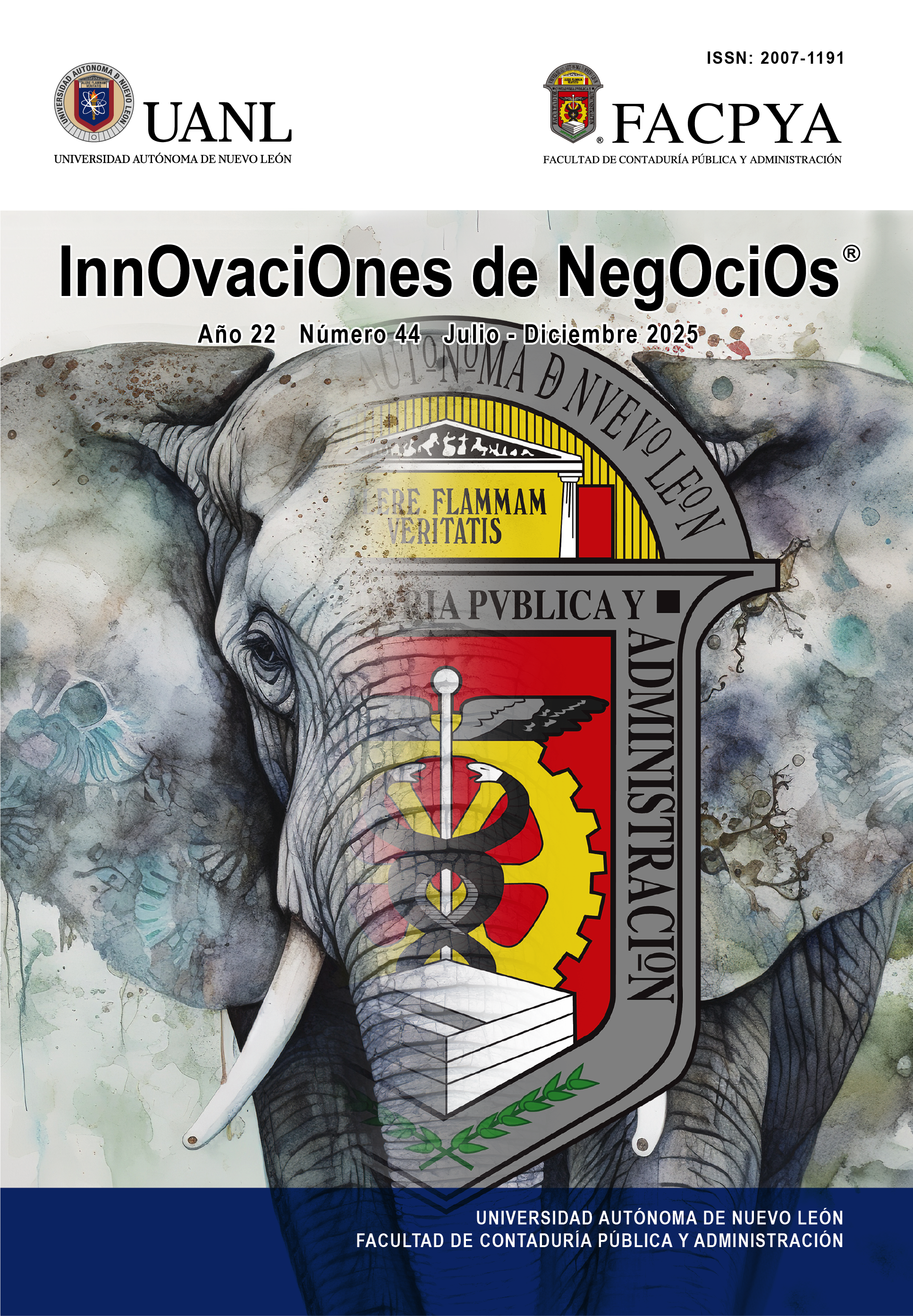Planeación Estratégica Potenciada por Tecnologías de Información y Web Tracking
DOI:
https://doi.org/10.29105/in22.44-478Palabras clave:
Web Tracking, Big data, Planeación estratégica, TIResumen
El objetivo es analizar cómo las tecnologías digitales, como el web tracking y el big data, potencian la planeación estratégica empresarial, mejorando la toma de decisiones y la competitividad. El método de investigación fue un enfoque cualitativo y exploratorio basado en la revisión documental de literatura científica y estudios de caso, complementado con análisis semántico mediante herramientas como MAXQDA. Así mismo los resultados integran web tracking y big data para mejorar la eficiencia operativa, predicción de tendencias y segmentación de clientes. Sin embargo, plantea desafíos éticos y regulatorios relacionados con la privacidad. Se encontraron limitaciones en la implementación ya que requiere equilibrar el aprovechamiento tecnológico con el cumplimiento normativo, destacando las regulaciones como GDPR y CCPA. Así el valor del estudio resalta la sinergia entre tecnologías digitales y planeación estratégica, ofreciendo un marco para adaptarse a entornos empresariales dinámicos. Así los hallazgos permite una planificación más flexible y dinámica, pero el éxito depende de un manejo ético y transparente de los datos
Descargas
Citas
Abrego Almazán, D., Sánchez Tovar, Y., & Medina Quintero, J. M. (2017). Influence of information systems on organizational results. Contaduría y Administración, 62(3), 303–320. https://doi.org/10.1016/j.cya.2016.07.005
Adamczyk, D. (2024). The chair of Honeywell on bringing an industrial business into the digital age. Harvard Business Review. (Agregar URL si está disponible)
Applegate, L., & Vitale, M. (1996). ToyWorld, Inc.: Information technology planning (Harvard Business School Case Study No. 9-196-075). Harvard Business School.
AWS. (n.d.). AWS solutions and services documentation. Amazon Web Services. https://aws.amazon.com/documentation/
Barthelmes, L., Kübler, J., & Bönisch, L. (2024). An open-source interactive travel diary for web-based trip reporting. Transportation Research Procedia, 76, 373–384. https://doi.org/10.1016/j.trpro.2023.12.062
Bazzoun, M. (2019). The digital economy. International Journal of Social Science and Economics Invention, 5(9), 116–123. https://doi.org/10.23958/ijssei/vol05-i09/157
Castell-Uroz, I. (2024). A novel approach to web tracking detection and removal with minimal functionality loss (Tesis doctoral, Universitat Oberta de Catalunya). Tesis en Red. https://tesisenred.net/handle/10803/690818
Cascón Katchadourian, J. D. (2020). Tecnologías para luchar contra la pandemia Covid-19: geolocalización, rastreo, big data, SIG, inteligencia artificial y privacidad. Profesional de la Información, 29(4). https://doi.org/10.3145/epi.2020.jul.29
Collis, D. (2016). Lean strategy: Startups need agility and direction. Harvard Business Review. https://owlnightstudy.com/wp-content/uploads/woocommerce_uploads/2022/02/Lean-Strategy-4katef.pdf
Cusumano, M. A., & Yoffie, D. B. (1999). Judo Strategy: Competing on internet time. Harvard Business Review. https://hbr.org/1999/01/judo-strategy-the-competitive-dynamics-of-internet-time
Ehikioya, S. A., & Lu, S. (2020). A traffic tracking analysis model for e-commerce. International Journal of Networked and Distributed Computing, 8(3), 171–193. https://doi.org/10.2991/ijndc.k.200515.006
Fong, S. (2012). Framework of competitor analysis by monitoring information on the web. Journal of Emerging Technologies in Web Intelligence, 4(1), 77–83. http://dx.doi.org/10.4304/jetwi.4.1.77-83
Kaplan, R. S., & Norton, D. P. (2007). Using the balanced scorecard as a strategic management system. Harvard Business Review. https://hbr.org/2007/07/using-the-balanced-scorecard-as-a-strategic-management-system
Liu, C.-H., & Liu, H.-S. (2009). Increasing competitiveness of a firm and supply chain with Web 2.0 initiatives. International Journal of Electronic Business Management, 7(4), 248–255.
Mankins, M., & Gottfredson, M. (2022). Strategy-making in turbulent times. Harvard Business Review, September–October, 1–9. https://hbr.org/2022/09/strategy-making-in-turbulent-times
Mankins, M. C., & Steele, R. (2006). Stop making plans; start making decisions. Harvard Business Review, January, 1–10. https://hbr.org/2006/01/stop-making-plans-start-making-decisions
Merchant, N. (2012). Why Porter’s model no longer works. Harvard Business Review. https://hbr.org/2012/02/why-porters-model-no-longer-wo
Mesa González, M., & David Tenorio, G. (2018). Estudio conceptual de Big Data utilizando Spring (Tesis de máster, Universidad Politécnica de Madrid). Archivo Digital UPM. https://oa.upm.es/53175/
Mintzberg, H. (1994). The fall and rise of strategic planning. Harvard Business Review. https://hbr.org/1994/01/the-fall-and-rise-of-strategic-planning
Pan, L., & Ruiz-Martínez, A. (2024). Evolution of web tracking protection in Chrome. Journal of Information Security and Applications. https://doi.org/10.1016/j.jisa.2023.103643
Porter, M. E. (1996). What is strategy? Harvard Business Review, November–December, 61–78. https://hbsp.harvard.edu/download?url=%2Fcontent%2Fsample%2F96608-PDF-ENG%2Fcontent&metadata=e30%3D
PREDIK Data-Driven. (2023). Big Data: Aliado clave de la planeación estratégica. https://predikdata.com/es/big-data-aliado-clave-de-la-planeacion-estrategica/
Puthiyamadam, T. (2017). How the meaning of digital transformation has evolved. Harvard Business Review. https://hbr.org/2017/05/how-the-meaning-of-digital-transformation-has-evolved
Ramírez, R., Churchhouse, S., Palermo, A., & Hoffmann, J. (2017). Using scenario planning to reshape strategy. MIT Sloan Management Review. https://sloanreview.mit.edu/article/using-scenario-planning-to-reshape-strategy/
Rathi, N., Riddell, L., & Worsley, A. (2016). What influences urban Indian secondary school students' food consumption? Appetite, 105, 790–797. https://doi.org/10.1016/j.appet.2016.07.018
Sosa, A. (2021). La regulación de la publicidad programática online: Un análisis desde el prisma del derecho comparado. Consumer Law eJournal. https://doi.org/10.18601/01236458.n56.07
Strycharz, J., Smit, E., Helberger, N., & van Noort, G. (2021). Empowering impact of technical and legal knowledge on rejecting tracking cookies. Computers in Human Behavior. https://doi.org/10.1016/j.chb.2021.106750
Tapscott, D., & Agnew, D. (1999). Governance in the digital economy. Finance & Development. https://www.imf.org/external/pubs/ft/fandd/1999/12/pdf/tapscott.pdf
Vergara Silva, J. C. (2004). La economía digital y el management. Revista Escuela de Administración de Negocios, 50, 55–63. https://journal.universidadean.edu.co/index.php/Revista/article/view/278/268
Weber, K., Story, M., & Harnack, L. (2006). Internet food marketing strategies aimed at children and adolescents. Journal of the American Dietetic Association, 106(9), 1463–1466. https://doi.org/10.1016/j.jada.2006.06.014
Zorrilla Salgador, J. P. (2006). The information as strategy in a competitive and global context (SSRN Working Paper No. 1803189). SSRN. https://ssrn.com/abstract=1803189
Descargas
Publicado
Cómo citar
Número
Sección
Licencia
Derechos de autor 2025 Juan Alfredo Lino Gamiño, Sergio Felipe López Jiménez, Isabel Olivares Alcaraz, Víctor Hugo Valdez Barreto

Esta obra está bajo una licencia internacional Creative Commons Atribución-NoComercial-CompartirIgual 4.0.
La revista InnOvaciOnes de NegOciOs es una revista electrónica gratuita y de acceso abierto de carácter científico-académico y es una publicación de la Universidad Autónoma de Nuevo León, en la cual los autores conservan sus derechos de autor y otorgan a la revista el derecho exclusivo de primera publicación del trabajo. Se permite que terceros utilicen el contenido publicado, siempre y cuando se reconozca la autoría del trabajo y se cite la primera publicación en esta revista.
Para mayor información favor de comunicar a la Secretaria de Investigación (FACPyA) de la Universidad Autónoma de Nuevo León. Teléfono: (81) 1340-4431. Correo electrónico: revinnova.negocios@uanl.mx










